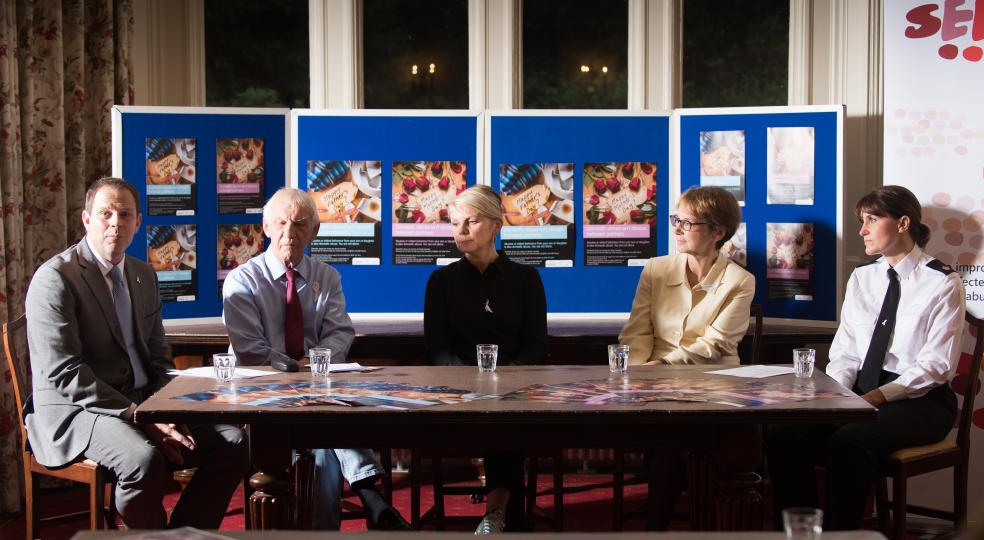
Domestic abuse isn’t always between partners
It’s easy to assume that domestic abuse is an issue that only affects partners or ex-partners within a relationship. However, an increasingly more common form of abuse, with potentially devastating results, is set to challenge those inherent beliefs.
Since 2011, in Devon alone, there have been two domestic homicide cases where the murderer is in fact the victim’s child. The child in question is not a young adolescent, but a grown-up adult child in their 20s or 30s.
The cases prompted the Safer Devon Partnership to launch an initiative to raise awareness of domestic abuse throughout the county, with the theme ‘Domestic abuse isn’t always between partners’, to coincide with 16 Days of Action, an international campaign which runs from 25th November, UN International Day for the Elimination of Violence Against Women (also known as White Ribbon Day), to 10th December, Human Rights Day.
In England in 2014, Karen Ingala-Smith, a frontline worker with more than 23 years experience, counted 15 mothers and four fathers who were murdered by their sons. In the first six months of this year, eight women have been murdered by their son, with three men, including step-fathers or fathers, and two girls murdered in these cases too.
These reports of domestic homicide are no more shocking than cases where a partner is murdered by a current or former partner, but the circumstances surrounding them are significantly more complex, with very few people recognising these as abusive relationships.
The difficulty in reaching out to a mother or father living with abusive behaviour from their son or daughter, is to help them understand that by asking for help, they are not a failing parent or putting their child at risk. In fact, by seeking help and support from services , they are taking the first step in improving their relationship with their child, as well as potentially saving their own life.
Although arguments are a part of everyday life, abusive or violent behaviour from a child of any age is not acceptable. Steps can be taken to help heal relationships or deal with any underlying issues that may be causing the behaviour.
The Safer Devon Partnership is therefore reaching out to the general public to raise awareness of domestic abuse between family members, with the message ‘abusive or violent behaviour from a son or daughter is domestic abuse’.
Speaking at an event to mark the launch of the campaign, Manager of the Safer Devon Partnership Nicola Channon said: “The reviews that have prompted this campaign highlighted this form of abuse which is under-reported. If anything good can come from these cases, it is the opportunity to educate and inform people, to signpost help for those living with this form of abuse and let them know that they are not alone.
She continued: “This form of homicide is tragic in so many ways; any relatives or friends are left to deal with the loss of not one but two family members, with many of the perpetrators being sentenced to life in prison. A mother’s love is unconditional, and it is often very hard for a mother to reach out for help with her child, but there is help available.”
Steve Brown, Assistant Director for Public Health in Devon said: “A fundamental problem that underpins domestic abuse between family members is the silence that surrounds it, resulting in a lack of public awareness. This can result in feelings of isolation and desperation with a lack of knowledge as to where people can turn for support. This campaign shows that there are many services available to support victims of any form of domestic abuse and we would like anyone living with any form of abusive behaviour to pick up the phone to get some help and advice.”
Also speaking at the event was trauma parenting specialist and trainer Jane Evans, who recently appeared on ITV This Morning and Channel 5 documentary ‘My Violent Child’. Jane has worked in domestic abuse and child protection for a number of organisations including the NSPCC and Barnardo’s. She discussed the prevalence of child on parent abuse, and that although there is no defined route cause there are similarities between each case. Jane has found that the children who display abusive behaviour have experienced another form of abuse in their life at some time. She said that often families were not aware that help and support is available and more needs to be done to support families living in these situations.
One survivor of domestic abuse said: “My story began before I was born (as often they do). My father was physically abusive to my mother during her pregnancy with me. She went into labour at 24 weeks. I spent the first ten weeks of my life fighting to survive in an incubator. I did not bond with my mother.
She continued: “The relationship with my child’s father was not physically abusive, but mental, emotional, physiological and controlling. My child started behaving aggressively and violently towards me from a young age. My child gets angry very quickly and I get really emotional, finding it very difficult to cope. My child has threatened me with a knife, attacked me, spit at me and kicked me and is very good at manipulation and can be very volatile. This all became regular behaviour. I was afraid to be at home alone as I am not strong enough to defend myself and would get very anxious. My child isn’t always like it and we are generally very close. We bonded from birth and have a very good, loving relationship most of the time. We are working through this together.”
Domestic abuse includes any incident or pattern of incidents of controlling, coercive or threatening behavior, violence or abuse between those aged 16 or over who are or have been intimate partners or family members regardless of gender or sexuality. This can include psychological, physical, sexual, financial and emotional abuse. Abusive behaviour from a child under the age of 16 is classed as child on parent violence or abuse. This is an emerging problem across the UK, with more cases of abuse perpetrated by children on their parents and carers being reported.
Devon and Cornwall Police Superintendent Sam de Reya said: “White Ribbon Day and campaigns like these help to raise awareness in the community of a problem that is still sadly all too common. My message is, don’t suffer in silence and get help if you feel threatened by one of your family, you are not alone, there are many professionals and partners who you can talk to.”
It has been estimated that one in four women and one in six men will be the victim of abuse at some point in their life, but less than half of all domestic abuse cases in the UK are reported. In many instances the victim may fail to realise they are even a victim, there can be unclear boundaries between victim and perpetrator, with the abuse often contextualized within existing family problems.
Domestic abuse can result in the victim’s self-confidence and self-belief destroyed and leaving the victim feeling responsible. In cases of adult child on parent abuse, this notion is often further exaggerated, as many parents feel responsible for what happens within their family.
A report by national family support charity, Family Lives, showed that only 56% of parents had sought help for their child’s aggressive behavior, with 35% not seeking help because they did not know where to turn to, a further 11% did not seek help because of the stigma, and 20% for fear of the damage it could do to their child’s life.
Support 16 Days of Action in Devon
This year’s campaign officially launches in November as part of Devon Domestic Abuse Awareness Week (DAAW) and 16 Days of Action, an international campaign which runs from 25th November, UN International Day for the Elimination of Violence Against Women (also known as White Ribbon Day), to 10th December, Human Rights Day.
Events will be taking place across Devon during 16 Days of Action, view the timetable of events here https://16daysexeter.wordpress.com/ and tweet #16Days on Twitter.
Support White Ribbon Day
To show your support for the UN International Day for the Elimination of Violence Against Women, also known as White Ribbon Day, add a white ribbon to your Twitter or Facebook profile here http://twibbon.com/support/white-ribbon-day-4













